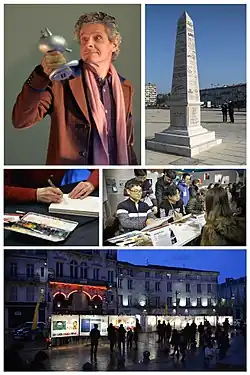Angoulême International Comics Festival
The Angoulême International Comics Festival (French: Festival international de la bande dessinée d'Angoulême) is the second largest comics festival in Europe after the Lucca Comics & Games in Italy, and the third biggest in the world after Lucca Comics & Games and the Comiket of Japan.[4][5][6] It has occurred every year since 1974 in Angoulême, France, in January.
| Angoulême International Comics Festival Festival international de la bande dessinée d'Angoulême | |
|---|---|
 Pictures from 44th Angoulême festival in 2017 | |
| Status | active |
| Genre | Comics |
| Date(s) | late January |
| Frequency | annual |
| Location(s) | Angoulême |
| Country | France |
| Years active | 1974–present |
| Inaugurated | 1974 |
| Founder | Francis Groux, Jean Mardikian, Claude Moliterni |
| Attendance | around 200,000 on average[1] and more than 220,000 in 2012[2] |
| Leader | Franck Bondoux[3] |
| Organized by | 9eART+ Société Organisatrice du Festival |
| Website | BD Angouleme.com |
History
The Angoulême International Comics Festival was founded by French writers and editors Francis Groux and Jean Mardikian, and comics writer and scholar Claude Moliterni.[7] Moliterni served as co-organizer of the festival through 2005.[7]
Attendance
More than 200,000 visitors[2][5] come each year to the fair, including between 6,000 and 7,000[8] professionals and 800 journalists.[4]
The attendance is generally difficult to estimate because the festival takes place all over the town, and is divided in many different areas that are not connected to each other directly.[9]
Official prizes
The four-day festival is notable for awarding several prestigious prizes in cartooning. The awards at Angoulême were originally called the Alfred awards, after the pet auk from Zig et Puce by Alain Saint-Ogan. In 1989, the name changed to the Alph-art awards, honoring the final, unfinished Tintin album by Hergé. In 2003, the Alph-art name was dropped, and they are now simply called "The Official Awards of the International Comics Festival" (le Palmarès Officiel du Festival international de la bande dessinée). In 2007, Lewis Trondheim (2006 Grand Prix winner) created a mascot for the festival, Le Fauve (The Wildcat), and since 2008 the prize winners have received wildcat statuettes, with the Best Album statuette coated in gold. Since this year, the award is called the fauve and the best album, the fauve d'or. The prizes were reorganized too, to create a pool of 40-60 albums, called "official selections," from which are awarded the "Best Album" prize, five "Angoulême Essentials," one "Revelation Essential" (given to rookie creators), and one Essential chosen by the public. The Heritage Essential (for reprinted material) and Youth Essential are selected from separate nominee pools.
Additionally, the Grand Prix de la ville d'Angoulême is awarded each year to a living creator honoring their lifetime achievement, and the Grand Prix winner becomes president of the next year's festival. Traditionally, the president heads the prize jury of the next year's festival, illustrates the festival poster, and is given an exhibition of his or her work. In 50 years, only three women have been awarded the prize: Florence Cestac, Rumiko Takahashi, and Julie Doucet.[10] [11]
Other prizes
- Prize for School Comic
- Prize for Young Talent (Prix Jeunes Talents)
- Prize for Young Talent from the Region
- "Strip" Prize
- Prize of the Students of Poitou-Charentes (secondary school)
- Prize of the Students of Angoulême (primary school)
- Prize for Alternative Comics
- Hippocampus Prize (for creators with disabilities)
- Other prizes have been created on the margins of the festival, known as the Off Of Off.[12][13] These awards are the Prix Tournesol, the Shlingo Award and the Prix Couilles-au-cul, literally translated as the "Balls to the buttocks" award, deriving from the french slang expression for bravery, and who celebrates and encourages artistic freedom in artists whose activism is repressed in their home countries.
Prize categories
- Grand Prize
- Prize for Best Album/Golden Wildcat
- Special Prize of the Jury
- Prize for Artwork
- Prize for First Comic Book
- Prize for a Series
- Prize for Inheritance
- Prix Jeunesse 9-12 ans (Youth prize, 9–12 years)
- Prix Jeunesse 7-8 ans (Youth prize, 7–8 years)
- Fanzine Prize
- Revelation Prize
- Best promotional comic
- René Goscinny award
See also
References
- Bell, Anne-Laure. "Angouleme International Comics Festival". French ambassy in the United Kingdom. Archived from the original on 15 July 2011. Retrieved 30 January 2012.
- Delcroix, Olivier (2012-01-29). "Angoulême : la BD en pleine forme". Le Figaro (in French). Retrieved 30 January 2012.
- Alverson, Brigid. "10 creators withdraw names from Angouleme Grand Prix list," Robot 6: Comic Book Resources (January 6, 2016).
- "Angoulême BD". Archived from the original on 18 January 2012. Retrieved 30 January 2012.
- "Honoured at Angoulême, Spiegelman tries to turn the page on 'Maus'". France 24. 2012-01-27. Retrieved 30 January 2012.
- Lancel, Xavier (25 January 2012). "Seven Hours Till Angoulême". Scarce/Bleeding Cool. Retrieved 30 January 2012.
- Pasamonik, Didier. "Disparition de Claude Moliterni, fondateur du Festival d’Angoulême ,"ActuaBD (Jan. 21, 2009). (in French)
- "professionals". Festival International de la bande dessinée d'Angoulême. Archived from the original on 28 January 2017. Retrieved 30 January 2012.
- Johnston, Rich (29 January 2012). "Standing Out In The Crowd". SCARCE At Angoulême. Bleeding Cool. Retrieved 30 January 2012.
- "Julie Doucet, lauréate du Grand Prix du FIBD 2022". ActuaLitté.com (in French). Retrieved 2022-03-21.
- "French comics festival marred by sexism row - BBC News". BBC News. 6 January 2016. Retrieved 6 January 2016.
- "Angoulême 2020 : Le Off of Off, le piment irrévérencieux du (...)". ActuaBD (in French). Retrieved 2022-03-21.
- "Angoulême 2022 : en marge du Festival, le OFF of OFF". ActuaBD (in French). Retrieved 2022-03-21.
External links
- Official website
- Awards (in French)
- "France takes its comics very seriously". BBC News. 2008-02-16. Retrieved 2010-01-01.
- ActuaBD (in French)
